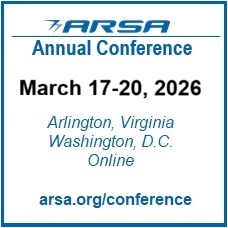Experiencing FAA Misunderstanding of Rulemaking Communications
On Aug. 22, ARSA offered to help the Office of the FAA’s Chief Counsel correct misunderstanding of ex parte communications during active rulemaking. Such engagement is a method of ensuring government-public collaboration encouraged by Department of Transportation policy. The office responded within a week, citing language from the DOT’s guidance that was advantageous to its position that no problem exists.
The Latin term “ex parte” means that a “one sided” information exchange took place without the knowledge of all interested parties. The law (see 5 U.S.C. 533) requires the agency “give interested persons an opportunity to participate…through submission of written data, views, or arguments with or without opportunity for oral presentation.” Citing the statute, the U.S. Department of Transportation’s guidance agrees there are “no explicit prohibitions against ex parte communications in informal rulemaking.” (Emphasis in original.)
ARSA’s letter, signed by Executive Director Sarah MacLeod and delivered to the chief of staff for the chief counsel, continued a theme sounded in the association’s public communications: FAA leadership mistakes the ex-parte protection as a prohibition against rather than instructions for gathering useful information during informal rulemaking. It referenced a long history of this confusion punctuated by a recent public event where an agency attorney reprimanded another representative for violating supposed ex parte prohibitions.
Despite the government’s misgivings, FAA personnel can discuss active rulemaking procedures with the public. If those discussions include substantive regulatory negotiations, involved stakeholders need only include a memorandum in the related docket for public consumption.
“Attorneys in the Office of Chief Counsel must clearly understand, communicate, and support the standards contained in the… [DOT] Ex Parte Communications memorandum,” the letter said. “That document clearly encourages open and continued dialogue with the public throughout the informal rulemaking process.”
Rather than take the association’s letter to heart with an eye towards improving communications, the Office of Chief Counsel denied the issue exists.
“Although our office agrees DOT’s ex parte guidance encourages contact with the public during informal rulemaking, we note it does place guideposts on such contacts,
particularly when discussing deliberative, non-public information to the public after the initiation of a rulemaking,” Laura Megan-Posch, FAA assistant chief counsel for regulations, said in her response. “In sum, although the guidance encourages open and transparent public participation in the rulemaking process, the guidance limits Agency participation in such contacts regarding a petition for rulemaking or after the initiation of a rulemaking.”
Lawyers tend to create adversarial positions even when they aren’t in confrontational proceedings. Informal rulemaking is not an adversarial process; that is why there is no prohibition against ex parte communication if all interested parties are made aware of the exchange and have a chance to comment. An industry representative with extensive experience and knowledge in the administrative process brought an issue to the agency’s Chief Counsel for discussion and resolution. In response, the government also requested details on the meeting and individuals involved in one example of hiding behind ex parte, contrary to the “blame free” safety management system principles touted by the agency. The response contained typical adversarial tactics, which did not surprise the author of the association’s letter. The response is merely proof of the problem, failure to communicate with the industry in meaningful ways.
ARSA’s strategy for improving regulatory compliance depends on open engagement between the FAA and its public. Whenever the agency uses excuses to avoid communicating with its regulated parties – “ex parte” has become such an excuse – the industry’s ability to improve government oversight is weakened. The association is pushing to correct the agency’s error in order to improve the rulemaking process consistent with the law.
To review ARSA’s letter, click here.
To review the FAA’s response, click here.








